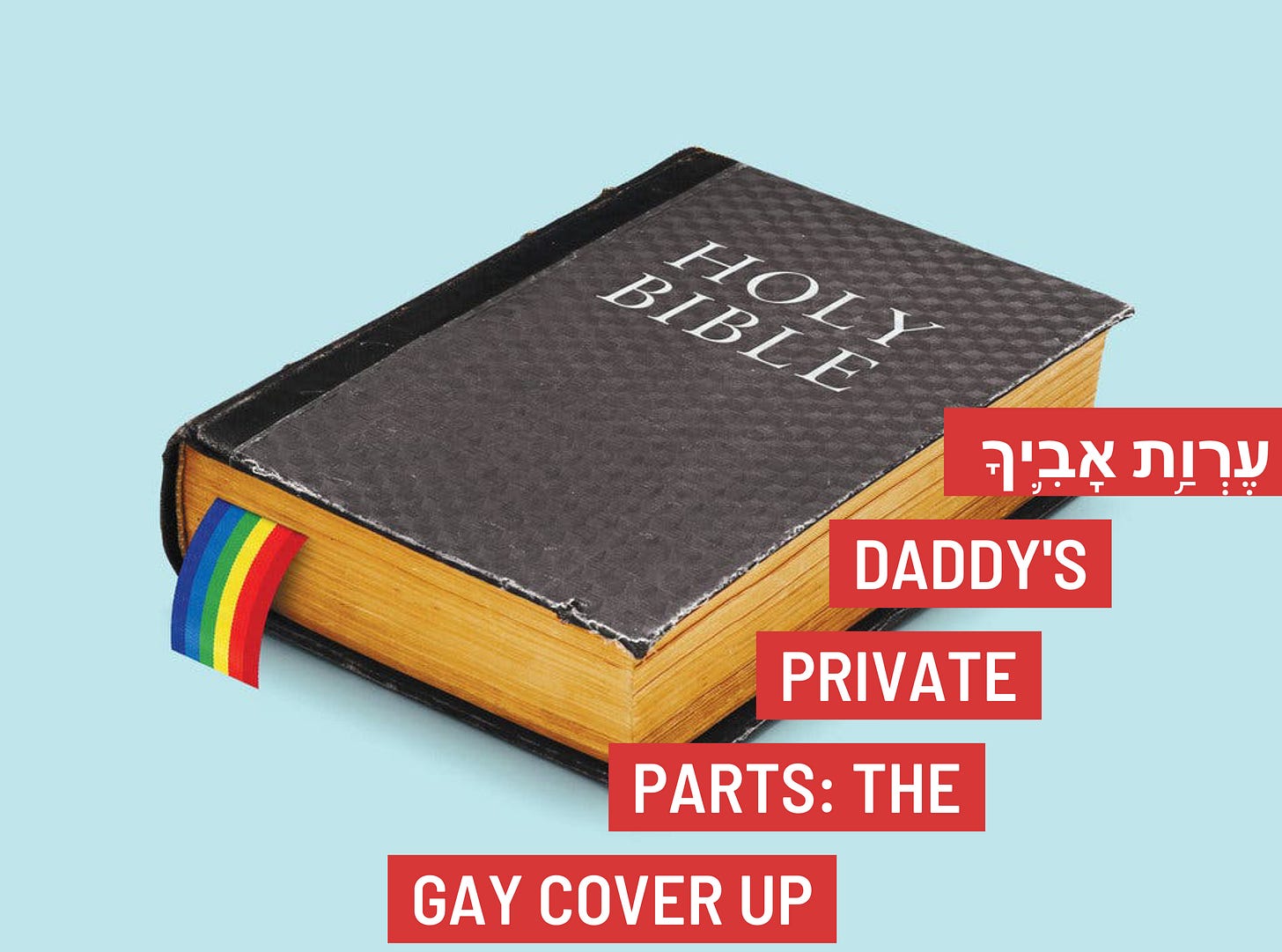Daddy's Private Parts: The Gay Cover Up
Va'Yikra 18:7
Back in 1982, My Bar Mitzvah highlights included a performance, center stage in our synagogue, chanting out loud the verses from these chapters in Leviticus, which include a long list of incest prohibitions, followed by the famous law forbidding sex between males. Nevermind right now the many years it’s taken me to process the text and figure out my response. My initial response to these loaded laws was relief. I remember that when I first began reading those verses, age 11, I realized that even adults were weird about sex, and uncomfortable. So much so that the biblical idiom is already a cover up for the act itself.
"Your father’s nakedness, and the nakedness of your mother, you shall not uncover; she is your mother—you shall not uncover her nakedness.” (Va 18.7)
‘Do not uncover nakedness’ I figured out, excited and curious, means don’t have sex - with parents, siblings, etc - and don’t even think about looking in that private parts direction. - which made sense. It was the precise prohibition for same-sex sex, coming later in the chapter, that I knew would one day be a challenge. Somehow, I sensed, there was a link between the linguistic cover up of explicit sexual terminology and the heternormative framework, written by and for males, that I was presented and expected to particiatpte in, no questions asked.
Some answers were found here, years later. A scholarly article by Dr. Idan Dershowitz, The Secret History of Leviticus, made it to the New York Times in 2018, unpacking the evolution of Leviticus and the context for these puzzling prohibitions: “No text has had a greater influence on attitudes toward gay people than the biblical book of Leviticus, which prohibits sex between men. Before Leviticus was composed, outright prohibitions against homosexual sex — whether between men or women — were practically unheard-of in the ancient world...” Dershowitz goes on to explain how the list of prohibitions was edited over time to make sure no assumptions about any sex between males would be made, even if earier periods may have more lenient, flexible, or silent about this natural attraction.
Leviticus 18’s list of incest laws is formulaic - always with the polite euphemism for intercourse “do not uncover nakedness.” Most laws make sense but two of them - including the one mentioned here, are odd. Is the prohibition against sex with one’s father - or with one’s mother - because she ‘belongs’ to the father? The same goes for uncle and aunt in the following verse. Those are the only two verses in the long list that include the possibilities of sex with male relatives, and scholars like Derwhowitz claim that these were edited later on to reflect ongoing development of sexual norms.
“It seems that with the later introduction in Leviticus of a law banning all male homosexual intercourse, it became expedient to bring the earlier material up-to-date by doing away with two now-superfluous injunctions against homosexual incest — injunctions that made sense when sex between men was otherwise allowed.”
Whether Dershowitz’s theory holds or not, what’s intriguing here is that this text, like all others, was edited to reflect shifting norms. My 13 year old suspicious mind was on to something. It’s a good thing that in these brave times there are many of us talking back to that text and revising what’s sacred, sexual, shame-less and divine, re-visting and revising our scriptures to more accurately mirror our complex evolving lives. The real abomination is the amount of hatred poured by humans upon each other as a result of these harmful texts.
As Dersowtiz concludes: “One can only imagine how different the history of civilization might have been had the earlier version of Leviticus 18’s laws entered the biblical canon.”
Image: @MattChase, New York Times
@idandershowitz
#abomination #nakedness #sacredsex #incest #idandershowitz #sex #leviticus18 #vayikra #homophobia #thesecrethistoryofleviticus #postpatriarchy #sexpositive
#hebrewmyth #929 #torah #bible #hiddenbible #sefaria #929english #labshul #929project #myth #belowthebiblebelt


From Edward Albee’s play, “The Goat”. Overwhelmed with a sense of loss and love for his father, Billy embraces Martin and kisses him sexually on the mouth. Martin pushes Billy away just as Ross enters to witness the scene. Martin angrily defends both his son and himself to Ross by stating: “He loves his father, and if it…clicks over and becomes—what?—sexual for…just a moment…so what?! So fucking what?! He’s hurt and he’s lonely and mind your own fucking business!”
You weave text, looking at Leviticus through the lens of a curious adolescent mind and historical roots of homophobia so well. Thank you.